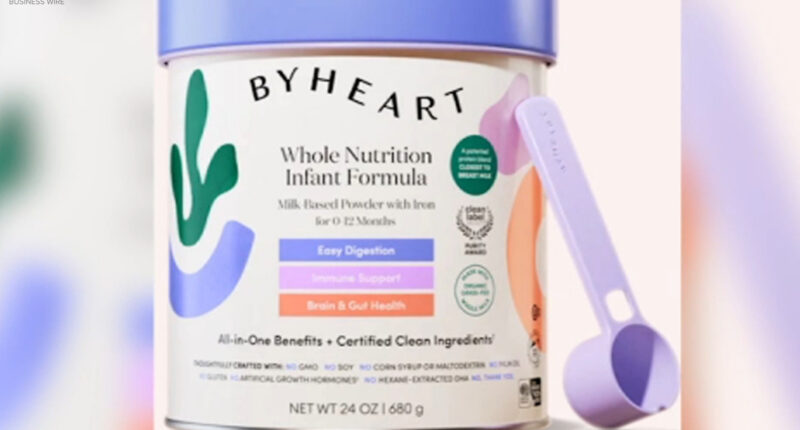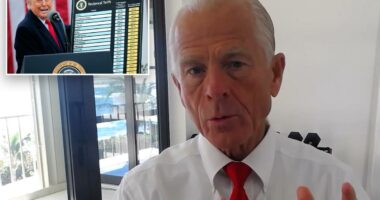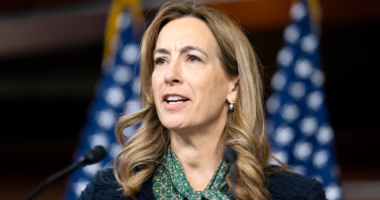Share this @internewscast.com
ByHeart, a company specializing in organic infant formula, has initiated a nationwide recall of its products due to a rising number of infant botulism cases.
Health authorities at both state and federal levels report that at least 15 infants across 12 states have fallen ill, marking an increase from the 13 cases reported over the weekend in 10 states.
The affected states, as of Monday, include Arizona, California (with two cases), Illinois (two cases), Minnesota, New Jersey, Oregon, Pennsylvania, Rhode Island, Texas (two cases), and Washington, according to the U.S. Food and Drug Administration.
Fortunately, no fatalities have been linked to this outbreak, which has been ongoing since mid-August.
ByHeart has advised parents and caregivers to stop using the formula immediately and to dispose of any remaining products.
Here’s what you need to know about the ongoing outbreak and the condition known as infant botulism.
The outbreak begins
The outbreak has sickened babies age 2 weeks to 5 months since it started. The infants were hospitalized after consuming ByHeart powdered formula, according to the U.S. Centers for Disease Control and Prevention.
California officials confirmed that a sample from an open can of ByHeart baby formula fed to an infant who fell ill contained the type of bacteria that causes the toxin linked to the outbreak. The tests to confirm contamination involve injecting mice with the cultured bacterium and then waiting up to four days to see if they get sick.
“These mice got sick really quickly,” Pan said in an interview.
ByHeart officials said they recalled their products “in close collaboration” with the U.S. Food and Drug Administration, “despite the fact that no unopened ByHeart product” tested positive for the illness-causing bacteria.
The FDA is investigating 84 cases of infant botulism detected since August. Of those, 36 consumed infant formula – more than a third of them ByHeart’s formula, the agency said in a statement.
“This information shows that ByHeart brand formula is disproportionately represented among sick infants in this outbreak, especially given that ByHeart represents an estimated 1% of all infant formula sales in the United States,” the FDA said.
Causes of infant botulism
Infant botulism typically affects fewer than 200 babies in the U.S. each year. It is caused by a type of bacteria that produces a toxin in the large intestine. The bacterium is spread through hardy spores present in the environment that can cause serious illness, including paralysis.
Infants are particularly vulnerable to infection because their gut microbiomes are not developed enough to prevent the spores from germinating and producing the toxin. They can be sickened after exposure to the spores in dust, dirt or water or by eating contaminated honey.
Symptoms can take weeks to develop and can include poor feeding, loss of head control, drooping eyelids and a flat facial expression. Babies may feel “floppy” and can have problems swallowing or breathing.
No known outbreaks of infant botulism tied to powdered formula have previously been confirmed, said Dr. Steven Abrams, a University of Texas nutrition expert.
Infant botulism treatment
The only treatment is known as BabyBIG, an IV medication made from the pooled blood plasma of adults immunized against botulism. California’s Infant Botulism Treatment and Prevention Program developed the product and is the sole source worldwide.
BabyBIG works to shorten hospital stays and decrease the severity of illness in babies with botulism. Because the infection can affect the ability to breathe, infants often need to be placed on ventilators.
All of the children in the ByHeart outbreak have received the medication, the CDC said. The treatment is delivered in vials that cost $69,300 apiece, Pan said.
Potential impact on U.S. formula supplies
There is little danger of infant formula shortages because ByHeart represents a small share of the market. That’s far different from the crises in late 2021 and 2022, when four infants were sickened by a different germ after consuming formula made by Abbott Nutrition. Two of the babies died. No direct link was found between the Abbott products and the infections caused by a different germ, cronobacter sakazakii, but FDA officials closed the company’s Michigan plant after contamination and other problems were detected.
Abbott recalled top brands of infant formula, triggering a nationwide shortage that lasted months.
In 2022, ByHeart recalled five batches of infant formula after a sample at the company’s packaging plant tested positive for cronobacter sakazakii. In 2023, the FDA sent a warning letter to the company detailing “areas that still require corrective actions.”
Reviewing infant formula ingredients
Federal health officials have vowed to overhaul the U.S. food supply and are taking a new look at infant formula.
Health Secretary Robert F. Kennedy Jr. has directed the FDA to review the nutrients and other ingredients in infant formula, which fills the bottles of millions of American babies.
The effort, dubbed “Operation Stork Speed,” is the first deep look at the ingredients since 1998.
FDA officials are reviewing comments from industry, health experts and public to decide next steps.
.
















